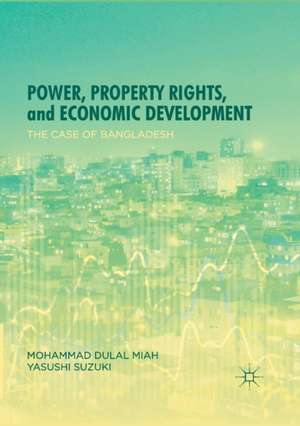Power, Property Rights, and Economic Development: The Case of Bangladesh
Autor Mohammad Dulal Miah, Yasushi Suzukien Limba Engleză Paperback – 18 feb 2020
This book presents a critical reassessment of theories of property rights, in response to conflicts and competition between different groups, and the state. It does so by taking an institutional political perspective to analyse the structures of property rights, with a focus on a series of case studies from Bangladesh. In doing so, the book highlights the importance of property rights for economic growth, why developing countries often fail to design property rights conducive for economic development, and the strategies required for designing an efficient structure of rights. Since property rights falls within the domain of Law and Economics, the book ventures to explain legal issues from an economic perspective, resulting in empirical analysis that comprises both legal and non-legal cases.
| Toate formatele și edițiile | Preț | Express |
|---|---|---|
| Paperback (1) | 381.98 lei 43-57 zile | |
| Springer Nature Singapore – 18 feb 2020 | 381.98 lei 43-57 zile | |
| Hardback (1) | 388.13 lei 43-57 zile | |
| Springer Nature Singapore – 29 noi 2018 | 388.13 lei 43-57 zile |
Preț: 381.98 lei
Nou
Puncte Express: 573
Preț estimativ în valută:
73.10€ • 76.04$ • 60.35£
73.10€ • 76.04$ • 60.35£
Carte tipărită la comandă
Livrare economică 14-28 aprilie
Preluare comenzi: 021 569.72.76
Specificații
ISBN-13: 9789811531453
ISBN-10: 9811531455
Pagini: 199
Ilustrații: XXIII, 199 p. 7 illus.
Dimensiuni: 148 x 210 mm
Greutate: 0.27 kg
Ediția:1st ed. 2018
Editura: Springer Nature Singapore
Colecția Palgrave Macmillan
Locul publicării:Singapore, Singapore
ISBN-10: 9811531455
Pagini: 199
Ilustrații: XXIII, 199 p. 7 illus.
Dimensiuni: 148 x 210 mm
Greutate: 0.27 kg
Ediția:1st ed. 2018
Editura: Springer Nature Singapore
Colecția Palgrave Macmillan
Locul publicării:Singapore, Singapore
Cuprins
Chapter 1: Introduction.- Chapter 2: Theories of Property Rights: Transaction Cost and Beyond.- Chapter 3: The Development Discourse in the Context of Bangladesh: An Analytical View.- Chapter 4: Political Origin of State Weakness.- Chapter 5: Patron-client Politics and the Rise of Business Class.- Chapter 6: Non-Market Allocation and Rent Seeking.- Chapter 7: Price Control and Property Rights.- Chapter 8: Toward and Appropriate Structure of Rights.- Chapter 9: Conclusion.
Notă biografică
Mohammad Dulal Miah received his PhD in Development Economics from Ritsumeikan Asia Pacific University, Japan. His research interests include property rights, economic development, the economics of rents and justice seeking, comparative financial system, corporate governance, etc.
Yasushi Suzuki is a Professor at the College of International Management, Ritsumeikan Asia Pacific University, Japan. His primary research interest focuses on the institutional political economy of financial development.
Textul de pe ultima copertă
This book presents a critical reassessment of theories of property rights, in response to conflicts and competition between different groups, and the state. It does so by taking an institutional political perspective to analyse the structures of property rights, with a focus on a series of case studies from Bangladesh. In doing so, the book highlights the importance of property rights for economic growth, why developing countries often fail to design property rights conducive for economic development, and the strategies required for designing an efficient structure of rights. Since property rights falls within the domain of Law and Economics, the book ventures to explain legal issues from an economic perspective, resulting in empirical analysis that comprises both legal and non-legal cases.
Mohammad Dulal Miah received his PhD in Development Economics from Ritsumeikan Asia Pacific University, Japan. His research interests include property rights, economic development, the economics of rents and justice seeking, comparative financial system, corporate governance, etc.
Yasushi Suzuki is a Professor at the College of International Management, Ritsumeikan Asia Pacific University, Japan. His primary research interest focuses on the institutional political economy of financial development.
Caracteristici
Presents a critical reassessment of theories of property rights with a focus on developing countries Demonstrates the importance of property rights for economic growth in the developing world Includes empirical analysis that comprises both legal and non-legal cases
